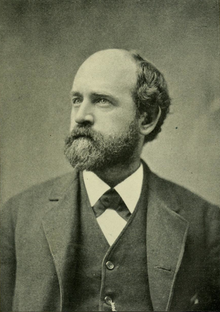Henry George
| Henry George | |
|---|---|
 |
|
| Born |
September 2, 1839 Philadelphia, Pennsylvania, USA |
| Died | October 29, 1897 (aged 58) New York City |
| Resting place | Green-Wood Cemetery, Brooklyn, New York |
| Nationality | American |
| Spouse(s) | Annie Corsina Fox |
| School or tradition |
Classical economics |
| Influences | |
| Influenced |
|
| Contributions | Georgism; studied land as a factor in economic inequality and business cycles; proposed land value tax |
Henry George (September 2, 1839 – October 29, 1897) was an American political economist, journalist, and philosopher. His immensely popular writing is credited with sparking several reform movements of the Progressive Era, and inspiring the broad economic philosophy known as Georgism, based on the belief that people should own the value they produce themselves, but that the economic value derived from land (including natural resources) should belong equally to all members of society.
His most famous work, Progress and Poverty (1879), sold millions of copies worldwide, probably more than any other American book before that time. The treatise investigates the paradox of increasing inequality and poverty amid economic and technological progress, the cyclic nature of industrialized economies, and the use of rent capture such as land value tax and other anti-monopoly reforms as a remedy for these and other social problems.
George was born in Philadelphia, Pennsylvania, to a lower-middle-class family, the second of ten children of Richard S. H. George and Catharine Pratt George (née Vallance). His father was a publisher of religious texts and a devout Episcopalian, and sent George to the Episcopal Academy in Philadelphia. George chafed at his religious upbringing and left the academy without graduating. Instead he convinced his father to hire a tutor and supplemented this with avid reading and attending lectures at the Franklin institute. His formal education ended at age 14 and he went to sea as a foremast boy at age 15 in April 1855 on the Hindoo, bound for Melbourne and Calcutta. He ended up in the West in 1858 and briefly considered prospecting for gold but instead started work the same year in San Francisco as a type setter.
In California, George fell in love with Annie Corsina Fox, an eighteen-year-old girl from Sydney who had been orphaned and was living with an uncle. The uncle, a prosperous, strong-minded man, was opposed to his niece's impoverished suitor. But the couple, defying him, eloped and married in late 1861, with Henry dressed in a borrowed suit and Annie bringing only a packet of books. The marriage was a happy one and four children were born to them. Fox's mother was Irish Catholic, and while George remained an Evangelical Protestant, the children were raised Catholic. On November 3, 1862 Annie gave birth to future United States Representative from New York, Henry George, Jr. (1862–1916). Early on, even with the birth of future sculptor, Richard F. George (1865 – September 28, 1912), the family was near starvation.
...
Wikipedia
